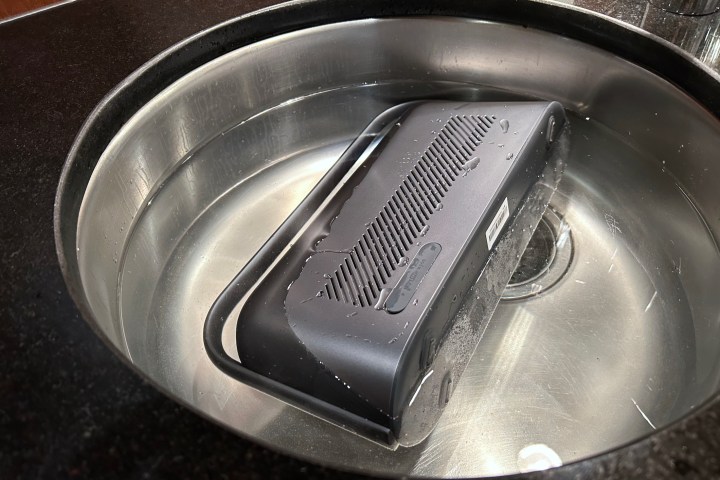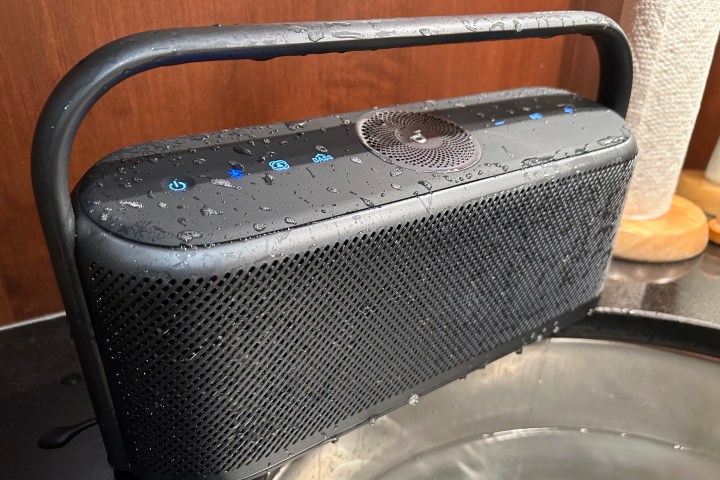- Sleek design
- Premium materials
- Waterproof and buoyant
- Expansive soundstage
- Tons of EQ control
- Small battery capacity for its size
- Won't charge devices
- Not robust enough for impacts
The fine folks over at Anker Soundcore would probably like me to emphasize that the company’s new portable Bluetooth speaker, the $200 Motion X600 — which you can buy starting May 6 — has an up-firing full-range driver built into the top in order to give it a kind of spatial audio sound — even when you’re listening to plain-ol’ stereo.
So fine, I’ll do that. Later.
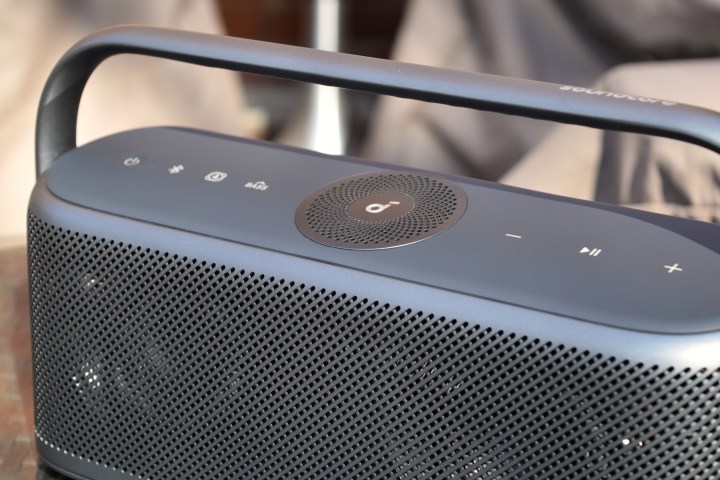
What I want to focus on first, however, is how good-looking this thing is. With the exception of a rubber membrane that covers the angled top surface (taking a break around that fancy extra driver), the entire speaker looks like it’s constructed from metal. And some of it is: the handle is made of aluminum, and the entire front grille is formed from stainless steel. The back panel is plastic, but it doesn’t matter because all of the parts share the same smooth, anodized aluminum-look finish with rounded edges that blend seamlessly into one another. If a MacBook Air and an 80s-era mini ghetto blaster spent one glorious night together, the Motion X600 would be their offspring.
And just like the MacBook Air, it comes in multiple colors: Polar Gray (seen here), Aurora Green, and Lunar Blue.
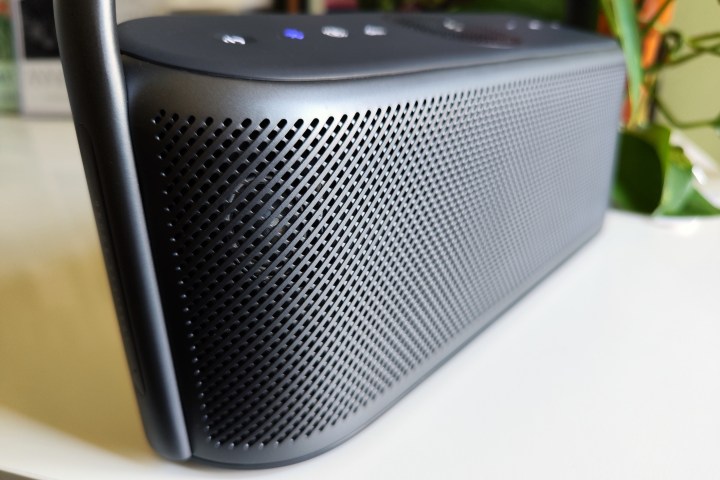
The one downside to such an elegant package is that the X600 won’t prove as impact-resistant as many of its portable competitors. The metal and aluminum parts will scratch and dent if you’re not careful. Thankfully, a set of grippy rubber feet will keep it from most inadvertent movements.
Despite being very slender — it’s only 3.25 inches deep — all of that metal (and the internal battery) give the speaker some serious heft. It weighs in at 4.2 pounds, which gives it a pleasingly solid, high-quality feel. You might think that the combination of its weight and nearly all-metal construction would make the X600 a bad candidate for poolside entertainment, but, amazingly, it’s IPX7-rated for water resistance and actually floats (though upside-down, so don’t expect to hear much of your tunes beyond the gurgly thump of the bass).
Did I try submerging it? Yes, I did. In a sink. Hey, it’s still winter here in Canada — don’t judge.
The X600 played the entire time and shrugged off the water like a champ. Keep in mind that its IPX rating covers water immersion, but it doesn’t offer any dust protection. So pools yes, beaches no.
The controls are all protected by the rubber membrane, and Soundcore keeps things simple: Power, Bluetooth pairing, play/pause (which also gives you track skipping), volume up/down, and two sound mode buttons for “BassUp” (a bass boost) and spatial sound. With white printing on a dark background, they’re easy to see in most lighting conditions, but they’re also backlit when the speaker is turned on — a really nice touch that you don’t see on many portables. It takes some pressure to make them click, though that seems like a reasonable tradeoff for a waterproof speaker. There is a slight delay when using playback controls — a press of the play/pause button can take up to 2.5 seconds to respond — which is a little annoying, but not a deal-breaker.
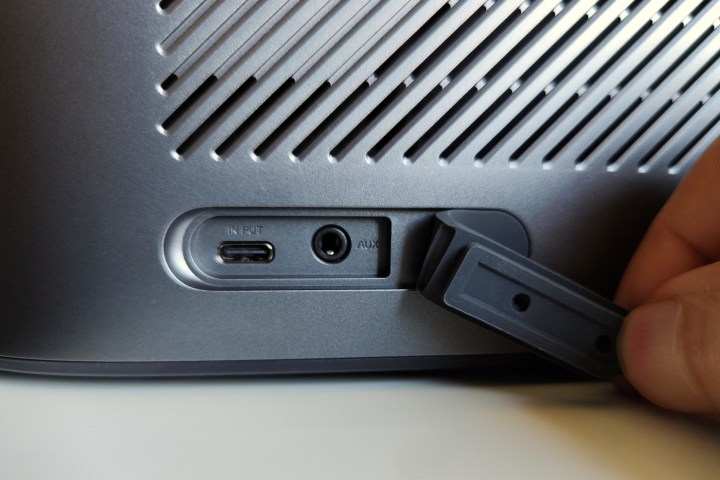
Around the back you’ll find a protected set of ports — one for charging (USB-C), and one for external analog audio sources (3.5mm). Soundcore includes a USB-A-to-C cable for charging — though not an actual charger — and a 3.5mm cable.
Inside that sleek shell is a series of five drivers. There’s one you can see (the top-firing, full-range “sky” driver as Soundcore refers to it) and four you can’t: two tweeters and two woofers behind the main grille. These are amplified by three discrete amps. Each stereo channel (a tweeter and a woofer) is powered by a 20-watt amp and a single 10-watt amp powers the sky driver, for a total of 50 watts. That might not be enough to energize a large backyard’s worth of party-goers, but it still gets impressively loud for its size, with almost no distortion. Indoors, in a kitchen or a living room, you won’t need anything else.
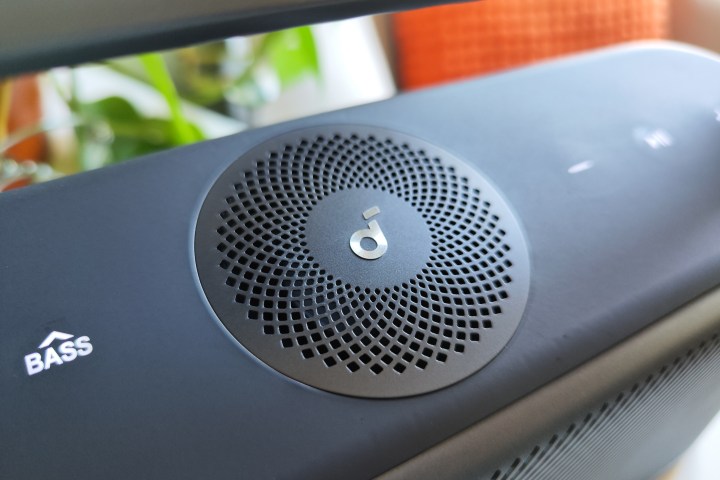
Sound-wise, the Motion X600 can be a bit of an unruly beast. Between the out-of-the-box tuning, the bass boost feature, the spatial mode, and the enormous amount of EQ range in Soundcore’s app, this Bluetooth speaker can go from a bit tinny and harsh to satisfyingly resonant and full-frequency. It all depends on how you use it.
In standard stereo mode, and without the bass boost enabled (which is how the speaker ships), the X600 can be decidedly underwhelming. All of the emphasis is seemingly shunted to the highs, the bass feels empty and midranges are gasping for air. The top-firing driver, which is supposedly a full-range unit, sounds strangled, with no weight at all. The four EQ presets in the Soundcore app (signature, voice, treble boost, and balanced) only enable mild tweaks, and I confess to being very confused by the shape of the so-called balanced preset — it doesn’t look very balanced to me.
Perhaps Soundcore has done this intentionally so that you get a “wow” moment when you turn on bass boost and spatial mode. In an instant, the X600 leaps to life in dramatic fashion, going from lamb to lion. Enabling these two features improves virtually every aspect, from dynamic range to the presence of those previously missing midranges, to the soundstage, which expands considerably. The previously annoyingly sharp highs are much better balanced because the top driver is allowed to reproduce its full frequency range.
Calling it “spatial” might be a bit of an overstatement. It isn’t compatible with spatial audio formats like Dolby Atmos Music, and it does not sound as truly 3D as a Dolby Atmos-compatible speaker like the Amazon Echo Studio, Apple HomePod, or Sonos Era 300 — but it is more immersive than a standard stereo portable.
If you place it a few feet away and sit more or less centered, you can hear the effect that Soundcore’s extra processing creates, with song elements that indeed sound like they’re coming from well outside of the speaker’s small footprint. Once I switched back and forth a few times to remind myself of the difference, I left the X600 with both features enabled and never looked back.
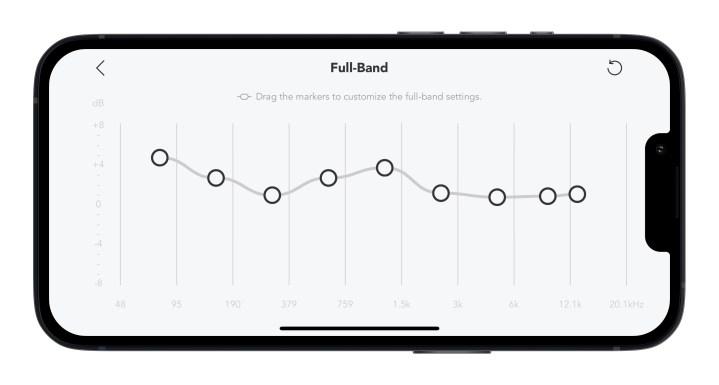
If you find that these modes overemphasize some frequencies and you don’t mind messing around with custom EQ settings, the highly adjustable, nine-point equalizer in the app can be adjusted a whopping ±8 dB across a huge array of selectable frequencies from 48Hz to 20kHz. Honestly, it’s overkill for a speaker like the X600, but it does give you an enormous amount of control.
Want an even bigger sound? You can take two Motion X600 speakers and create a stereo pair via Bluetooth.
A quick aside on some of the labels you may see Soundcore using on both the X600 itself and on its Amazon product page. My review unit came with a badge on the left side that says “Lossless Sound,” but this is not a lossless wireless speaker.
Lossless refers to two things: a song that has been digitally encoded in a way that no information from the original recording was lost, and, streaming Bluetooth codecs that make the same promise when you’re playing wirelessly from a phone. For the X600, the first doesn’t apply — it doesn’t actually encode or play lossless digital audio directly, and the second doesn’t apply either. It is indeed a certified wireless hi-res audio speaker, thanks to its support of the LDAC Bluetooth codec (currently only available on Android handsets), but LDAC is still a lossy — not a lossless codec.
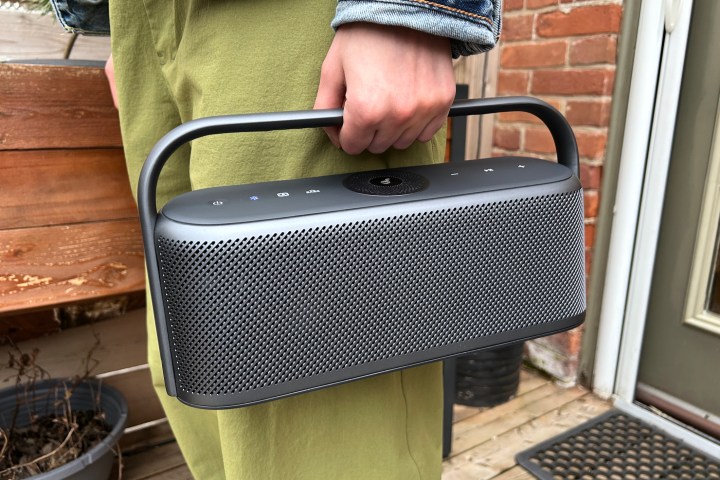
Does any of that matter? Probably not. In this case, it simply means the X600 won’t sacrifice as much quality over a Bluetooth connection as speakers that only support lesser codecs, like SBC and AAC. Still, LDAC is itself a bit of an unruly beast, and unless the speaker and your phone are in very close proximity (like three feet or less), you likely won’t get the full benefit of its 24-bit/96kHz capability. And if you’re only streaming Spotify? You won’t notice at all.
Soundcore says the Motion X600 will give you about 12 hours of play on a single charge, but keep in mind that’s based on playing at about a 50% volume level, with spatial and bass boost options turned off. Play louder and with those features enabled and that number will drop precipitously — down to as low as five hours. For a portable Bluetooth speaker of this size, that’s very much on the low side of things. You’ll find several models that can get closer to 20 hours, including the Marshall Emberton II, Marshall Middleton, and Sony SRS-XG300.
The Soundcore Motion X600 might not be packed with features like speakerphone capabilities, power bank device charging, or a party mode for linking multiple speakers, but its sleek, mostly-metal design makes it an unusually attractive option, while its integrated handle and excellent water protection provide exactly the kind of utility you need from a portable speaker. Once you dial in the sound, it’s an impressive little boombox.


